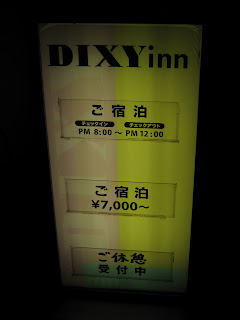I don't think that I could maintain a blog about Japan for over a year and not make some mention of love hotels. I know that love hotels now exist outside Japan, but the Japanese did invent them (apparently, the first one was in Osaka) and hence I should say something on the topic.
Before I go any further, I should say that I have never been to a love hotel nor will I ever go to one! Sorry to disappoint you. But as you should know, this is a G-rated blog!
Love hotels cater for young people, who live with their parents or in a share-house, and want a little privacy from time to time. This is quite understandable given that the high cost of rent in major Japanese cities can make it difficult for many young people to live alone.
In Tokyo, the love hotels are concentrated in two
distriucts: (i) Kabukicho in Shinjuku and (ii) Dogenzaka in Shibuya. I took a walk through the love hotel district in Dogenzaka one night to take some photos of love hotels for my blog. The district is absolutely packed with them. It is essentially a
maze of narrow streets lined with love hotels. Each one has a sign outside advertising its rates, so it's quite easy for two young paramours to determine which establishment best fits their budget. Talking about prices, love hotels can be booked for short stays of a few hours called "rests"
or the entire night which is called a "stay". A "rest" of 90 minutes
may be as cheap as 2,000 Yen (about USD 25).
Given the number of love hotels that exist, I can only conclude that they must be popular and profitable. Still, they all look a little tacky to me. However, setting aside my personal opinions, I think they do serve a purpose and should be considered another great Japanese invention (see more about Japanese inventions at http://ourmaninjapan101.blogspot.jp/2011/07/japanese-inventions.html).
Below are some photos I took of love hotels in Dogenzaka. As you can see, there are a lot and most of them have terrible names. That said, I am struggling to think of a good name for a love hotel. And of course, all the photos were taken from outside!
Thank you for reading and take care.
 |
| Above: What is a "wowow DVD"? |



































